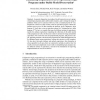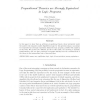120 search results - page 6 / 24 » Disjunctive Logic Programming and Autoepistemic Logic |
110
click to vote
LANMR
2007
15 years 1 months ago
2007
Abstract We study the notion of strong equivalence between two disjunctive logic programs under the G3-stable model semantics, also called the P-stable semantics, and we show how s...
KR
2004
Springer
15 years 5 months ago
2004
Springer
Disjunction is generally considered to add expressive power to logic programs under the stable model semantics, which have become a popular programming paradigm for knowledge repr...
115
click to vote
ASP
2003
Springer
15 years 4 months ago
2003
Springer
Abstract. In general, disjunction is considered to add expressive power to propositional logic programs under stable model semantics, and to enlarge the range of problems which can...
94
Voted
AMAI
2007
Springer
14 years 11 months ago
2007
Springer
Abstract. Partial equilibrium logic (PEL) is a new nonmonotonic reasoning formalism closely aligned with logic programming under well-founded and partial stable model semantics. In...
98
Voted
CORR
2007
Springer
14 years 11 months ago
2007
Springer
In this paper we show that an arbitrary propositional theory, when interpreted under the answer sets semantics (called Equilibrium Logic for this general syntax), can always be re...


